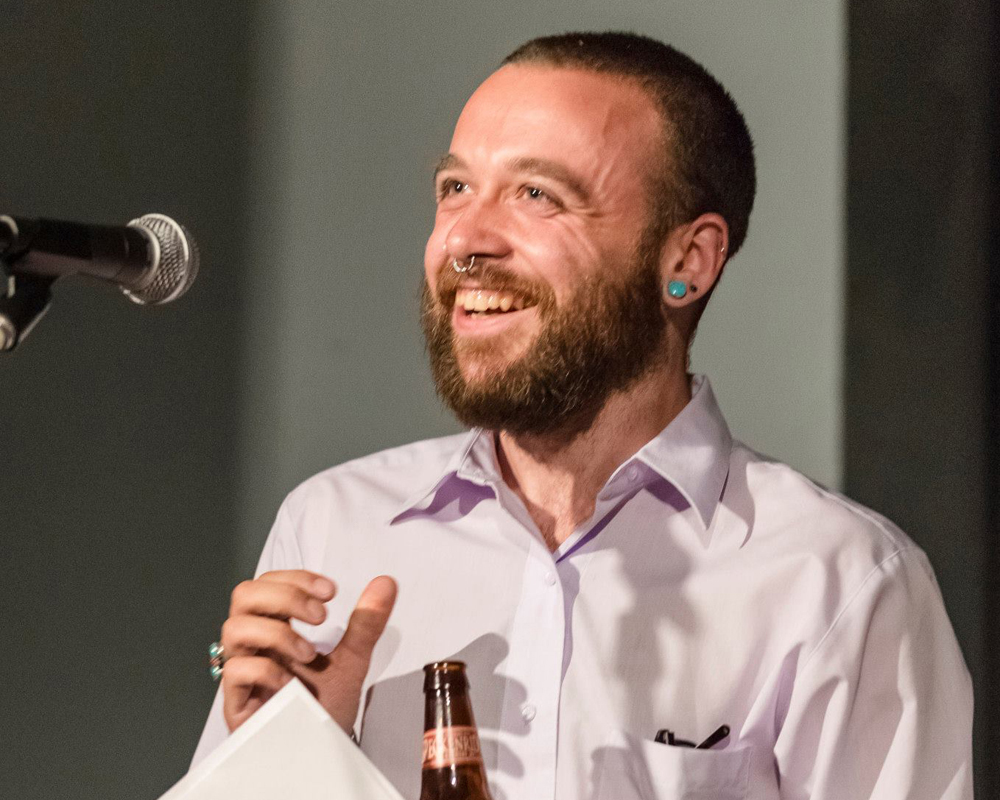This is the second in a series of interviews with some of the best open mic hosts I’ve seen on my informal tour of open mics across America.
The idea is to pull back the curtain on what it takes to be a host, what hosts want out of an open mic, and how to make an event work when you have no idea what’s going to happen. And maybe even hear a poem or two about open mics.
This week, it’s the fabulous Lewis Mundt, host of The New Sh!t Show, where every performance is a debut.
Go long, she said. Give examples, she told them. Tell stories.
The Basics
Tell me about the open mic you run (or have run)—the rules, the structure, the venue. How long have you been doing this? Did you launch it or inherit it from another host? That kinda thing.
The New Sh!t Show itself wasn’t my idea; it started as a spoken word series for new work in San Francisco and was run by sam sax and Nic Alea, two really fantastic people and writers. But honestly, I never made it out to one in the Bay Area and I didn’t really know a lot about it before we started the Minneapolis offshoot. I knew it was spoken word, people loved doing it, and that there were Austin and Boston spinoffs so I had it in the back of my head for awhile that there could be a local edition.
I was looking for a new project in the fall of 2013 and I reached out to sam and Nic asking what it would take to Minneapolis running. They basically just said go for it, have a blast, and let ‘em know how things turned out. I had no concept for a format, only a guess at what the other shows looked like, and some really, phenomenal community allies: Allison Broeren, who runs Word Sprout and has been a mentor and leader in the Twin Cities performance community for a very long time; and Kate Kunkel Bailey, owner/operator of our home venue Fox Egg Gallery and a celebrated storyteller, artist, and human being.
Our first event was in April 2014, and the format’s the same as it was then: Every third Friday of the month, we open Fox Egg Gallery in South Minneapolis at 7:30 p.m. and set out the open mic sign-up list. The first three slots are first-come first-serve and the fourth is a random draw. Once the open mic is over, we take a little break and then head into our four or five featured performers, who get up to 10 minutes to perform their “new shit,” work that can be old, new, in or out of the genre they’re known for, solo, collaborative, multimedia, anything — as long as it’s never been shown to an audience before. That’s the whole hook of the New Sh!t Show: everything on stage is a world premiere.
What makes Minneapolis’ a little different is it’s intentionally multi-genre. We have such an incredible performance community in the Twin Cities that I didn’t want to limit the venue to just one kind of art, so we didn’t. We regularly feature poets, fiction writers, musicians, actors, comedians, mimes, storytellers, improv troupes, dancers, anything; as long as it’s new, performable, and doesn’t make anyone in the audience or on stage feel threatened or unsafe, it’s game. It’s a total wildcard. I don’t screen or ask about material for the show, I don’t want to know ahead of time, and sometimes I book performers I’ve never met. Like I say every month, truly the only people who know anything about what’s going to happen are the people about to do it.
A Little Flattery and Some Introspection
In my (evidence-based) opinion, your open mic is one of the best I’ve been to. What do you think makes it great?
That’s very kind, and I’m glad the spirit caught you! I was so happy you were able to find us and to join us when you did.
One thing I love about our open mic portion is that it doesn’t feel like a warm-up. I go to a lot of readings and sometimes there’s this division between the “pre-show” and the “main event,” and sometimes the audience doesn’t really tune in until the final act. At the New Sh!t Show, every single performer, whichever half they’re in, comes to the stage the same way: They’ve got something to try out and they’re hoping it goes over well.
So really the only difference between the open mic performers and the featured acts is that the features get 10 minutes and I know who they’re going to be ahead of time. I think that makes a huge difference; everyone’s playing the same game.
One thing I really loved about your event was that you ask performers to bring only fresh work they’ve never done live before. Where did that concept come from and how does it affect the performers, the audience, the overall character of the event?
Confession: I don’t know how they run other New Shit Show events. I’ve never been to one and I didn’t ask for too much information ahead of time (which turned into kind of the whole spirit of the show.)
So I knew the concept that the work was supposed to be new, but that came with the question: What does new mean here? I had to paw at that until a definition came out, because commissioning new work felt like a big ask but I didn’t want people to feel like testing something new would be a big gamble compared to what other people might do. So I think the balance we struck, that everything has to have never been performed before, does the job it’s meant to: People have to risk something, but how much is totally up to them. And in that risk there’s a vulnerability that opens the performer and creates an instant connection with the audience, and vice versa.
We talked about why the open mic is so successful, which I think captures the reason the show is successful: The audience is super receptive to the open mic format because that’s…kind of what they showed up to see in the first place. The show format builds this inherently collaborative and supportive environment because everyone’s already there to celebrate the creative process and every little stumble and success that has to come with it. NSS Minneapolis is often a really high-energy, responsive, warm setting because the barrier between a performer taking a chance on material and an audience member coming out to see what happens is so thin. Both are like, “Well, here we go.”
Another thing I loved was the variety of talent—poets, musicians, improv skits, a guy modeling jewelry he made. Is it always like that or did I just get lucky that night?
It’s kind of always like that, emphasis on kind of. Some nights, four poets get up and just read poems and that’s the show. Some nights we’re moving the stage between acts and plugging in loop pedals and two performers are crowd-walking to get audio samples. I try to book each show with genre and style in mind and put together a “something for everyone” event, but since I don’t ask performers what they’re going to do ahead of time, it’s a little of anybody’s guess month to month.
Let’s Get Deep and Personal
What, in your opinion, is the purpose of an open mic?
It can be hard to feel like a member of a writing community. For one, writing tends to be this super solitary process because so much of it is so personal. For another, when you do share, there are all these arbitrary measures of worthiness and success and how to prove yourself. It can feel discouraging because as a writer you’re putting yourself out there a lot and sometimes the only channel for that is asking someone else to say whether or not the way you see and interpret the world is “good enough.”
In my opinion, an open mic is a place where everyone is enough–more than enough–by just wanting to be there. Artists can stand up for the first time or the thousandth time; they can read things that are beautiful and they can read things that are ugly; they can try something they’ve never tried before or they can do something very comfortable. Honestly, I kind of think open mics are sacred spaces, even if that sounds silly, because you can bring yourself to them in whatever form you want and can take that day.
Do you have a philosophy or a manifesto as a host?
Everyone should at least have the opportunity to get on stage. That’s the mantra that guides a lot of events I host and when I’m able, I have an open mic before events–book releases, concerts, my regular shows, readings when I tour. People come to hear others perform and feel so moved by the energy that they want to engage with it, and I think there should always be at least the chance for them to act on that.
That’s why we have the random draw for the last slot of the NSS open mic: there’s no “too late,” there’s no “all full.” There’s only, “Yes, you’ve got the chance everyone else does tonight, and thanks for being here.”
What would you say are the 3 biggest keys to success—by which I mean longevity—for an open mic?
- As a host, the event’s not about you.
- You can’t go into an open mic with expectations.
- Every event is like a grand opening; I’ve been to open mics where it’s obvious the host/producer and the regulars were in on their own jokes and it shut everyone else out of feeling like they could really be a part of things.
Have you ever written a poem about open mics? If so, is there a link or video I can share?
I ran another open mic in college and wrote one poem about the first anniversary of it, but the poem was mostly about a weird relationship I was in at that point and making out in a car while these neighbor kids played catch with an activated fire extinguisher in my alley, so no. (…I guess I could have just jumped to “no.”)
Tell Us a Story (or Two)
What’s your idea of a Damn Great Night of open mic—in terms of talent, audience, or anything else?
Nights that people really come to share and be a part of something, versus nights that performers are showing up to do something for themselves and then take off at the intermission. Our show is so feedback based, if only in the participation of everyone’s attention, that it can really throw the room off it someone’s on stage only to be on stage.
Has your open mic been the catalyst for creative collaboration among your regulars or semi-regulars?
There’s a strong community of literary event organizers in the Twin Cities, and we try to go to each other’s shows. I think some of the major collaboration has just been borrowing structure/stage ideas from each other, as well as introducing new performers to folks booking other events. I love when I see someone who’s performed at NSS recently on a bill put together by an organizer who was at their show.
Let’s Talk Rules and Technique
How hard core are you when it comes to open mic etiquette?
The New Sh!t Show is about the new shit, but it’s also a shit show, y’know? Sometimes a three-minute open mic slot turns into 10 minutes of freestyling. That’s when I start slow-clapping and walking to the stage, but it’s always been received kindly.
What’s the most effective way you’ve found to encourage good audience and stage behavior?
I start every show by screaming at the audience. I get on stage and shout, WELCOME TO THE NEW SHIT SHOW MINNEAPOLIS.
As an organizer, I want a small poetry reading to be more exciting than a show at Madison Square Garden, and the way I try to make that happen is to start with a bang and get everyone cheering so we can carry that energy into the open mic. But I’d be so remiss if I didn’t say that I’m the luckiest host: We have the best audience and performers in the world. Everyone is kind, there’s no heckling, people show up with an open mind and only love to give. It’s wonderful. I don’t know what I did to deserve it, but everyone at the show has been game for it from day one.
What’s your strategy on nights when, for whatever reason, the list is really thin? Say, fewer than 5 performers.
Let it go. I get to cheat out the open mic a little bit because there’s always the feature slots coming up afterward, so if the list is a little thin we just start the show later and make as much noise for one performer as we would for four.
Show Me Your Wishlist
Any plans to modify your format or otherwise tweak your event?
In 2017 I’m expanding from four feature performers to five, just to be able to showcase more artists. Otherwise, no. If it ain’t broke, y’know?
If you could perform at (or just attend) any open mic, slam, or other poetry event in the United States, all expenses paid, which one would it be?
Write About Now in Houston, hands-down. Look at their photos and tell me that’s not exactly where you want to spend a summer evening.




